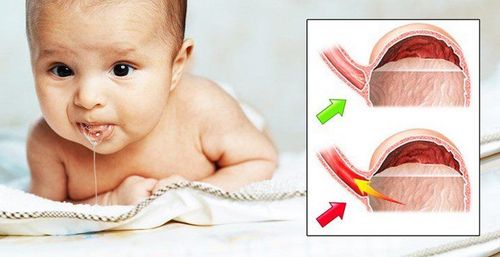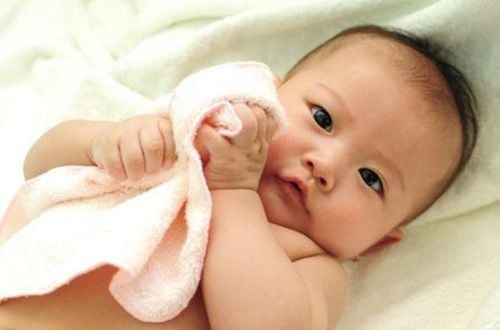This is an automatically translated article.
The article was professionally consulted by Specialist Doctor I Bui Thi Ha - Pediatrician - Neonatologist - Department of Pediatrics - Neonatology - Vinmec Ha Long International General Hospital.1. Messages from a baby's cry
It is no coincidence that babies cry a lot, in fact, when babies are about 3 months old, crying has more messages. Through crying, babies can express their psychological and emotional state from the first moments of their life. This change corresponds to the gradual development of the child's ability to socialize.A baby's cry is a signal with a scale, the higher or stronger the sound, the greater the child's insecurity. But we need to rely on more information to guess the exact reason why babies are fussy. Here are the common reasons why babies cry for parents' reference.
Trắc nghiệm: các chỉ số cần chú ý về sự phát triển thể chất của trẻ
Chiều cao, cân nặng của bé ở từng giai đoạn nên là bao nhiêu là bình thường, bao nhiêu là bất thường? Cùng ThS.BS Ma Văn Thấm điểm lại xem bạn đã nắm được các chỉ số phát triển thể chất của bé chưa nhé!The following content is prepared under supervision of Thạc sĩ, Bác sĩ y khoa, Ma Văn Thấm , Nhi , Phòng khám Đa khoa Quốc tế Vinmec Dương Đông(Phú Quốc)
2. Reasons why babies cry a lot
Because the baby is hungry This may be the first thing parents often think of when they see their baby cry. Some signs of hunger in a newborn baby are crying a lot, mouth twitching.Due to dirty diapers When diapers or diapers are dirty, some children will immediately signal to their parents when they want a diaper change. Others can tolerate dirty diapers longer. In both cases, parents should test the baby's diaper and change it immediately if necessary.
Due to sleep deprivation, sleepiness Adults often think that when children are tired, they can fall asleep anytime, anywhere. In fact, things are not so easy, some babies can cry and sleep, especially when they are too tired.
Want to be hugged and comforted by parents Newborns often need cuddles, caresses, and feelings of protection. Babies love to feel the presence of their parents through their faces and voices. Many children even recognize the unique scent of each person. Crying can be a baby's way of asking to be loved and cuddled. Some parents will wonder if they will damage their baby by carrying too much, but rest assured, in the first months of life, the baby will not be damaged in this way.
Baby has abdominal discomfort (bloating, colic or other problems) In fact, infant colic is defined as crying that cannot be comforted, for at least 3 hours a day, 3 days per week for at least 3 consecutive weeks. If you often see your baby fussy a lot right after feeding, it is likely that your baby has colic. Many parents self-medicate their children with anti-colic medications, but it is best to consult your doctor before using these medications.
Even if your baby doesn't have colic after feeding, a few episodes of abdominal bloating can be miserable. If you suspect your child has gas, try simple measures such as placing him on his back, holding his legs, and moving him around like he's riding a bicycle. Some other causes can cause colic in young children such as: gastroesophageal reflux disease, gastroenteritis, ....
Baby needs to burp Giving your baby a burp is not mandatory but it can be quite useful if parents see their baby crying after eating. Many babies have a habit of swallowing a lot of air when breast-feeding or bottle-feeding, causing gas to become trapped, causing discomfort.
Too cold or too hot When changing diapers or cleaning, bathing or due to air conditioning, weather....baby may feel cold and react by crying. Newborns like to be kept warm but not too hot. In general, babies are less likely to complain about being hot compared to being cold, and when they are hot they won't cry as hard as when they are cold
Teething babies Teething can be a painful experience because when teeth come in they will through the hard gum layer causing pain. The degree of suffering from teething varies among babies, but in general, no baby is immune to discomfort or tears at a certain point during teething.
If your baby seems to be in pain and you don't know the cause, try to probe the baby's gums with your hand, you will most likely realize that the baby is in the process of teething. Babies usually get their first tooth when they are 4-7 months old, but it can be earlier or later.

Many babies like to be tightly wrapped in diapers because it helps them feel safe in the noisy world. If your baby is too old to be swaddled or if he doesn't like it, arrange a quiet, low-stimulating place for him to rest so his emotions can calm down.
Want to be more stimulated Some children are quite “active” and eager to explore the world. Often the only way to stop a fussy baby is to keep her active. Of course, this can be exhausting for parents. So come up with ideas for lots of activities such as meeting with families with babies. Take your child to places that are suitable for children, such as playgrounds, children's museums, or zoos.
The baby is not well If the parents have comforted and fully met the basic needs, but the baby still does not stop crying, it is necessary to look for signs of illness, such as thermography to see if the baby has a fever. Be prepared to take your baby to the doctor if necessary.
Other Small Reasons Some babies fuss a lot because of problems that are hard to spot, like when a hair is tightly wrapped around a toe or finger, blocking blood circulation. Doctors refer to this painful condition as “grove-toe syndrome.” This is one of the signs parents need to check when they see a baby crying for no reason. In addition, some babies are especially sensitive to items such as rough clothing labels. Babies can be extremely upset with the smallest detail, from the way you are held to the type of bottle you feed your baby in.
3. What to do when the baby cries a lot?
The way that parents express and behave when the child is fussy is the first common language between the two. If coaxing calms a child, parents will feel more relaxed and reassured. On the contrary, it will be a feeling of helplessness and stress if the baby cries persistently and cannot be comforted. So here are some suggestions to help parents handle situations where a baby is fussy:Try to stay calm. Keeping a calm attitude before their baby's cry will help parents stay awake to recognize the messages their baby wants to convey, then comfort them with a gentle voice. Use the power of caress. When feeling insecure, worried children often want to be petted by their parents to calm down. Stroking helps children relieve stress, gain a sense of security and calm themselves. Parents should try to hold the baby more to reduce the crying of the baby. Rearrange the activities of the day according to your child's schedule. For example, if your baby often cries at a certain time in the evening, don't schedule anything to do at this time. Consider having dinner before your baby usually cries. Allow yourself to be away from your baby for a while. In stressful moments, parents can ask relatives or friends to look after the baby for a few minutes so that you can walk around your area. If you can't find someone to help and you feel like you're going to be 'overwhelmed', put your baby in a safe place like her crib and 'hide' to another room or out into the yard for a few minutes. Take advantage of a little nap. Take advantage of naps when your baby is sleeping during the day, especially if he's fussy a lot at night. If possible, ask a relative to look after the baby for a while so that the mother can take advantage of the extra sleep. If the weather is favorable, parents can take the baby out to change the air, sunbathe to supplement vitamin D when needed. If the child has symptoms of gastroesophageal reflux, vomiting, anorexia, night crying, difficulty swallowing, let the child lie with his head high, coax him to burp after feeding, thicken food and divide it into several meals. If the condition is more serious, parents need to take the child to a doctor for proper diagnosis and treatment. In case the child often cries at night but still eats normally, develops well, and excludes medical causes, parents should not be too worried, should create a comfortable sleeping environment for the baby, help the baby sleep early and properly. more hours .
For children to be healthy and develop well, it is necessary to have a nutritious diet in terms of quantity and quality balance. If children are not provided with adequate and balanced nutrients, it will lead to diseases of excess or lack of nutrients, which adversely affect the comprehensive development of children in terms of physical, mental and motor skills.
Children who do not eat properly are at risk of micro-mineral deficiency causing anorexia, growth retardation, malabsorption,... If they notice the above signs, parents should supplement their children with products. The supplement contains lysine, essential micro-minerals and vitamins such as zinc, chromium, selenium, and B vitamins to help fully meet the nutritional needs of children. At the same time, these essential vitamins also support digestion, enhance nutrient absorption, help improve anorexia, and help children eat well.
Parents can learn more:
Signs of zinc deficiency in children
Micronutrient deficiency and failure to gain weight in children
Please regularly visit Vinmec.com website and update useful information to take care of your child. Take care of the baby and the whole family.















